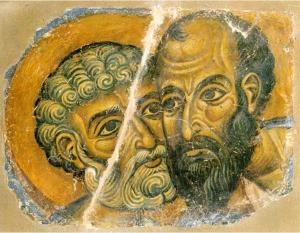Feast of Sts. Peter and Paul - Looking Beyond the Question
Today we celebrate Peter and Paul, two great apostles and heroes of our faith. But that's not how they started out. Peter continually tried to hide from responsibility and yet it was he whom the Lord chose to lead the disciples and the infant Church community. Paul was a devout Jew who persecuted the early Christians. Yet it was he who championed the rights of all people to embrace the Gospel. Through these two very limited human beings the work of Spirit was enabled and the community of the people of God within the world began to form and take shape.
 In the Gospel today, we hear Jesus ask two very pointed questions: "Who do people say I am?" and "Who do YOU say I am?" The disciples' response to the first question reveals that some believed he was John the Baptist, Elijah, Jeremiah, or one of the prophets - all of whom were dead. Maybe that's what the people thought, but maybe that's what the disciples thought as well.
In the Gospel today, we hear Jesus ask two very pointed questions: "Who do people say I am?" and "Who do YOU say I am?" The disciples' response to the first question reveals that some believed he was John the Baptist, Elijah, Jeremiah, or one of the prophets - all of whom were dead. Maybe that's what the people thought, but maybe that's what the disciples thought as well.
But when personally confronted with the second queston, Peter answers: "You are the Christ, the Son of the living God." He proclaims Jesus as the Son of the "living God." God is a "living God," who moves with us from place to place and from time to time. Ours is not a God who speaks to us through dead prophets. Rather, God is present to us now, at this time of our lives and in the place we currently find ourselves. And Jesus is the concrete sign and reminder to us of our "living God."
Who do you say that I am? The Lord asks the same question and offers the same challenge to us. Do you know who I am? Do you really know me? But there is an implied crucial follow-up question as well: "How well do we know Him?"
Do we know Him well enough to trust His promise to lead us into eternal life with God who is Love?
Do we trust in His promise that we will discover our life's true meaning and purpose in and through our love for one another? We believe that Jesus is at work in our community of faith, building us up, healing our wounds, helping us resist the forces sin and death. But do we really believe that the "gates of the nether world will not prevail" against us?
The world around us is also asking: "Who are you? What are you all about? Why do you do what you do?" If Christianity is to have a worthwhile message to the contemporary world, it must be based on the vision of God that we have received from Jesus himself. It must be based on what He himself saw his mission to be. Like Peter and Paul, we are to be His hands, His eyes, His heart, His body. We are to bring His light and truth to our world. In His name, and by His power, we are called to remake the face of the earth, to renew our world, to overcome evil and suffering, to restore all things in Christ, the Son of the Living God.